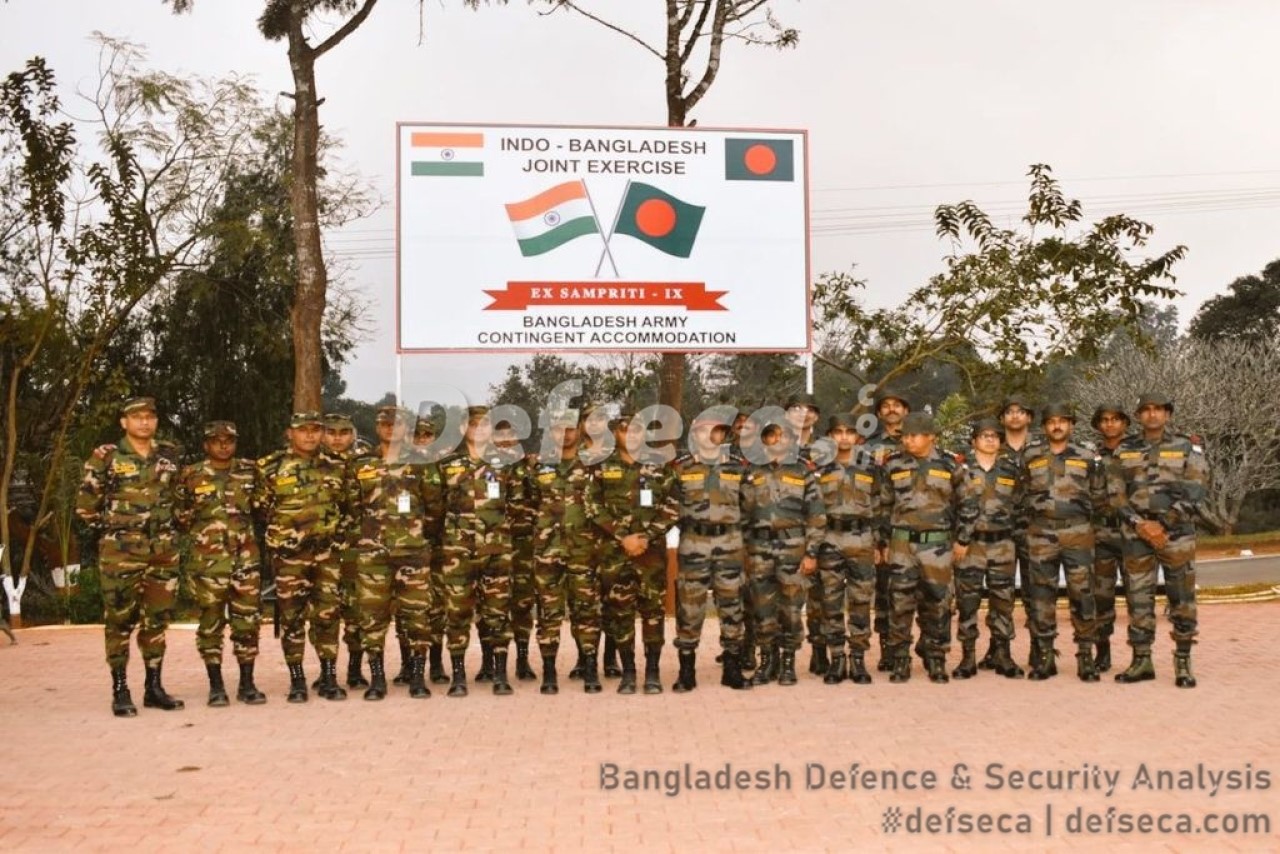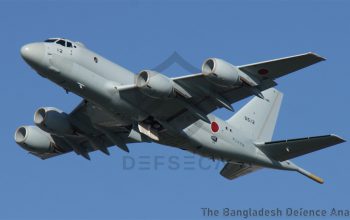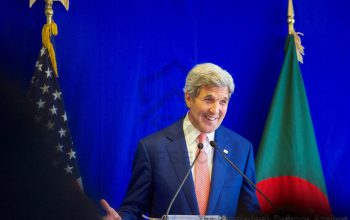India’s heavy investment in Bangladesh may be at risk. A wave of anti-India sentiment is sweeping much of the South Asian country over New Delhi’s efforts to win concessions that go beyond the normal and in the realms that many Bangladeshis fear, could compromise their national security.
The Coronavirus pandemic may have frustrated, what many in Bangladesh fear, India’s long-cherished “dream” to court Dhaka for a controversial bilateral treaty that could ultimately lead to India’s absolute control of its neighbour’s military establishment. Bangladesh could face political unrest at home if its government does not deny New Delhi the space it is longing for a greater foothold on its soil.
At heart is India’s attempt to cajole Bangladesh into a military partnership under another new agreement that would favour India more than Bangladesh. The proposed treaty was to be signed during Indian Prime Minister Narendra Modi’s visit to Bangladesh which has now been called off due to COVID-19 pandemic. Some Bangladeshi student organisations and political groups had announced to stage anti-Modi protests, if the visit had taken place, vowing not to allow Modi to come to Dhaka.
Modi’s March 17 visit was slated to join the 100th birth anniversary of Banga Bandhu (friend of Bengal) Sheikh Mujibur Rahman, Bangladesh’s founder. But suspicions abound among common Bangladeshis that Modi was not coming to pay respects to the country’s founder but to sell a treaty to its hosts that would have led to the sale of substandard and obsolete Indian military hardware.
China’s influence
China is currently Bangladesh’s largest military hardware supplier. Between 2008 and 2018, China supplied $1.93 billion worth of weapons to Bangladesh. This constitutes 71.8 percent of Bangladesh’s military acquisitions over this period, making China far and away the biggest supplier of arms to Dhaka.
The latest treaty was mentioned by Indian foreign secretary Harsha Vardhan Shringla at a seminar in Dhaka on March 2, 2020. “Our on-going efforts to develop a robust partnership between our militaries emphasise trust of a higher order,” Shringla said, adding that “especially since we are willing to share with you any and all military hardware manufactured in India.”
India is also open to facilitating training opportunities for officers at all levels in premier military intuitions in both the countries, he said while speaking at a seminar on Bangladesh-India relations on the first day of his two-day official visit to Bangladesh.
India’s bets on Bangladesh’s military
India has, for too long, lobbied to replace China as Bangladesh’s arms supplier. But China already enjoys strong ties with Bangladesh. Besides supplying Bangladesh weapons, it has also pledged 38 billion dollars towards infrastructure development in Bangladesh as part of its ambitious Belt and Road Initiative.
Prime Minister Sheikh Hasina, who owes a lot to her backers in New Delhi for sustaining her 12 years rule, has often been accused by her critics of using numerous bilateral agreements to pave the way for India’s domination over her country.
“Those who have the slightest knowledge of subcontinent history and India’s treatment of Bangladesh for almost half a century cannot consider it as its friend,” says Dhaka University professor, Ashraful, who requested not to be identified by his real name because of fears of reprisals by the government. He says India imposed numerous agreements on Bangladesh since its independence, starting with the November 7, 1971, agreement with the then provisional government of Tajuddin Ahmad, exiled in India. “All the seven conditions of that agreement were detrimental to the incoming independent Bangladesh,” he says. “One of those conditions said: Bangladesh wouldn’t have any professional armed forces, but will maintain a paramilitary force (which later emerged as Rakkhi Bahani, allegedly under Indian command).”
However, Bangladesh’s founder Sheikh Mujib, defying that agreement, laid the foundations of a professional military, which remains an eyesore for India. Bangladesh’s army has won praise for its efficiency, and courage and contribution to the UN peacekeeping operations.
India has invested heavily on Bangladesh’s political landscape to win goodwill and allies. And it has paid dividends. Bangladesh’s drift towards India gained steam during the reign of Sheikh Hasina. She has been accused of pleasing New Delhi by accepting all its unending list of demands. Hasina’s unusual tilt has contributed to increasing the anti-India sentiment that already existed in the Bangladeshi society for years.
Shahab Enam Khan, professor of International Relations at Jahangirnagar University says that the Bangladeshi public’s perception of India will only veer towards the negative because of the recent situation in India, involving its treatment of Muslims. “The anti-India sentiment has increased sharply over the years, largely due to Bangladesh’s foreign policy weaknesses along with the Indian media’s persistent negative projection of Bangladesh as ‘India’s backyard’,” says Khan.
Does India want to sell military hardware to Bangladesh?
Bangladeshis living overseas also see the rot in India’s overtures. “India designs to dismantle Bangladesh Army and has a history of organising coups after coups to weaken it,” says Irtaza Shalayheen, a student at Washington State University. “Why should Bangladesh be bound to buy military hardware from India when New Delhi itself is world’s second-largest arms importer? India-manufactured armaments are so bad in quality that Indian forces aren’t ready to use those, not even rifles,” he says.
Strategically too, military acquisition from India makes no sense to Dhaka University’s Ashraful. “How we will use Indian weapons against the Indian army, in case of any hostilities?” He says Bangladeshi military will be forced to use Indian military hardware against Indian military that uses weapons produced by Russia, US, France, Israel, Germany etc. should any border tensions go out of hand. “Our army having Indian arms will not be able to face even Myanmar, because Myanmar purchases arms from China, Russia, Israel and other countries,” he adds.
India’s offer of training the Bangladeshi military officers is being looked at with even deeper suspicions. “Those who will go to India to get training will be brain-washed. We have seen it before. Many of those who went to India on numerous scholarships, educational tours and under cultural exchanges were brainwashed,” Ashraful says.
Some defence analysts in Bangladesh also fear that an India-trained Bangladeshi army will not have the moral power to fight their teachers from Indian army. They fear that such a partnership could evolve into Bangladeshi military become an extension of Indian army and which could be ultimately used against China and Pakistan.
Why Should Bangladesh trust India?
Bangladesh has not enough reasons to trust India. New Delhi not only dishonours its treaties and commitments, but also imposes its policies on Bangladesh. “India deprived us of the waters of 54 international rivers, including the Ganges, Teesta, Surma, and others, either by dishonouring the treaties or without any treaty,” Ashraful says. Water experts in Bangladesh warn that the Indian plans to divert the waters of all the upstream rivers to its western and southern regions by implementing its ‘National River Interlinking Scheme’, will be a death-blow to Bangladesh.
“Though India uses our highways, railways, seaports and other facilities almost free of cost, but it doesn’t allow Bangladesh to use its land to connect with Bhutan or Nepal, which is only 21km off Bangladesh territory,” says Ashraful while referring to Siliguri Corridor, also known as Chicken’s Necks in West Bengal.
Bangladeshi analysts of all shades are unanimous in their opinion that their country should maintain cordial relations with India safeguarding its national interests. These relations must be mutually beneficial and ensure that New Delhi makes all the necessary policy adjustments that shows its sincerity. But India lacks such sincerity, they opine. Despite already having a defence pact with Bangladesh, they add, India is making efforts to impose the new agreement to tighten its grip on Bangladesh further.
Some former members of Bangladesh’s military are also not mincing words in expressing their reservations about the trend. A former senior officer of Bangladesh Army, requesting anonymity and who now lives in the US, says the Bangladeshi armed forces must have a say before the conclusion of any future agreements with India. “It is a normal practice that the armed forces of almost all the countries, including India, scrutinise all the agreements, MoUs and treaties as they are related to the interests of the country,” he added. “The complexity of its relations with India and Bangladesh’s national interests demand that we stay clear of any more defence-related agreements with India that could compromise our national security, independence and sovereignty,” he added.




